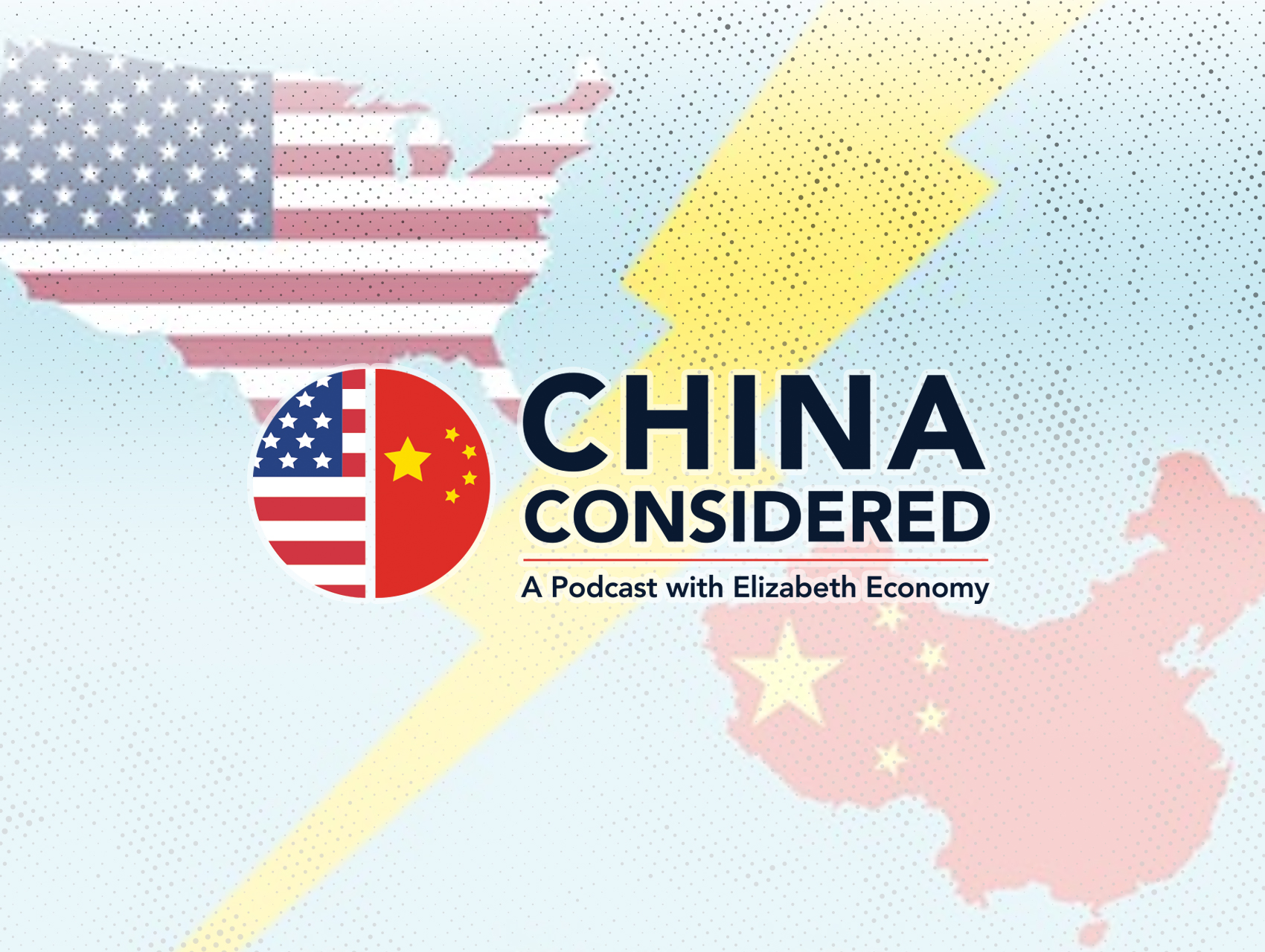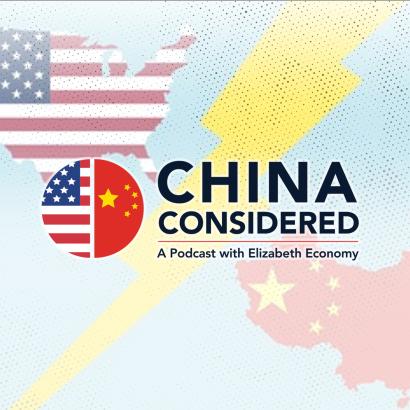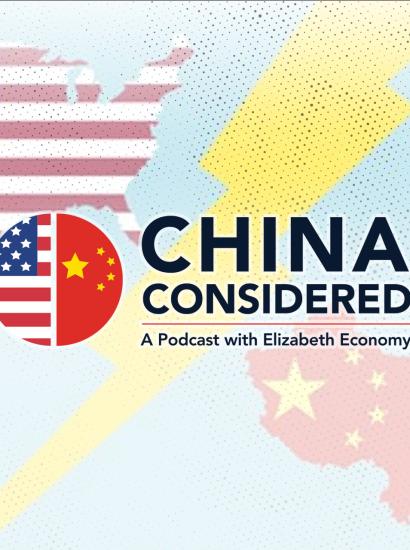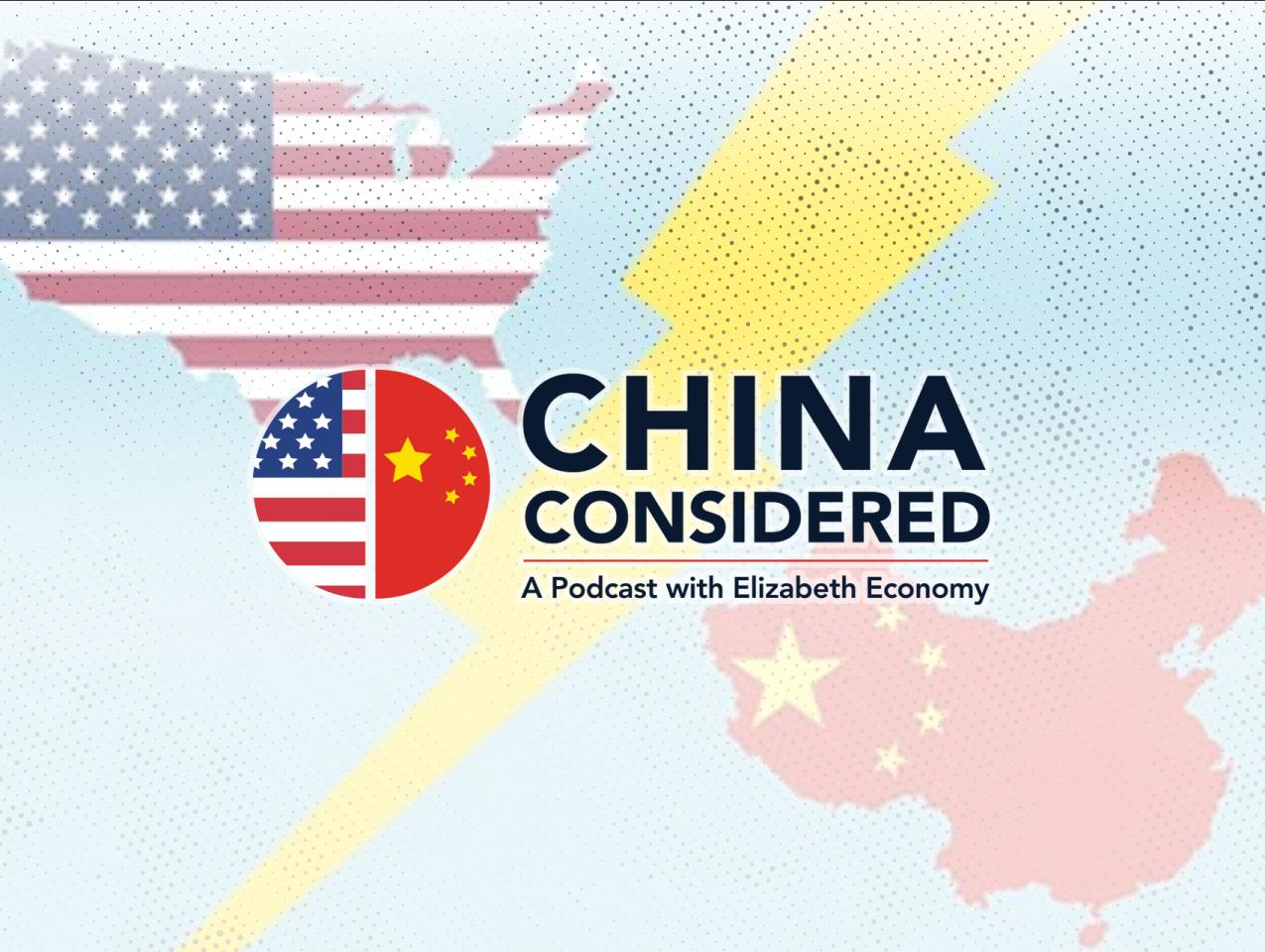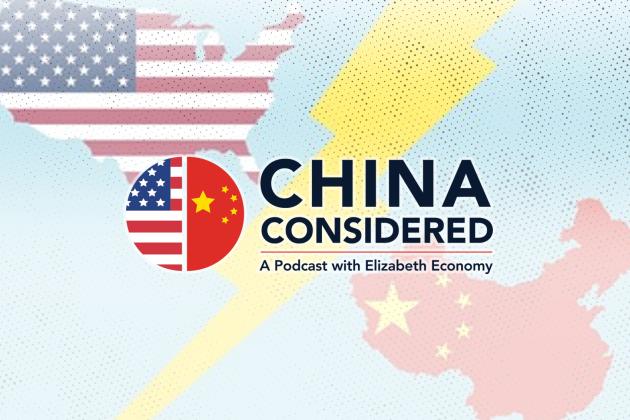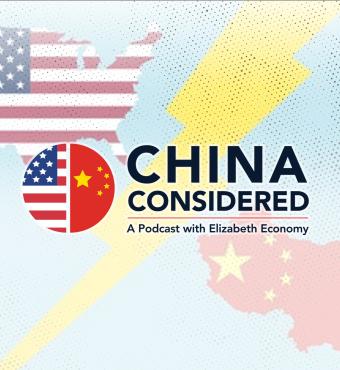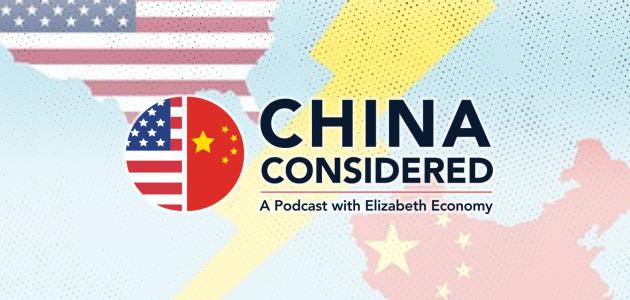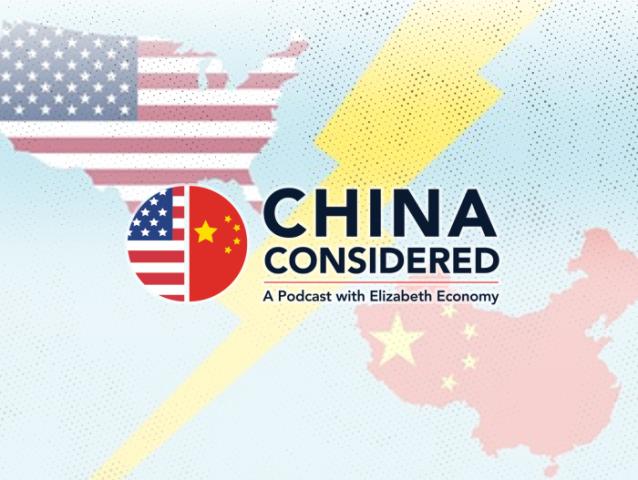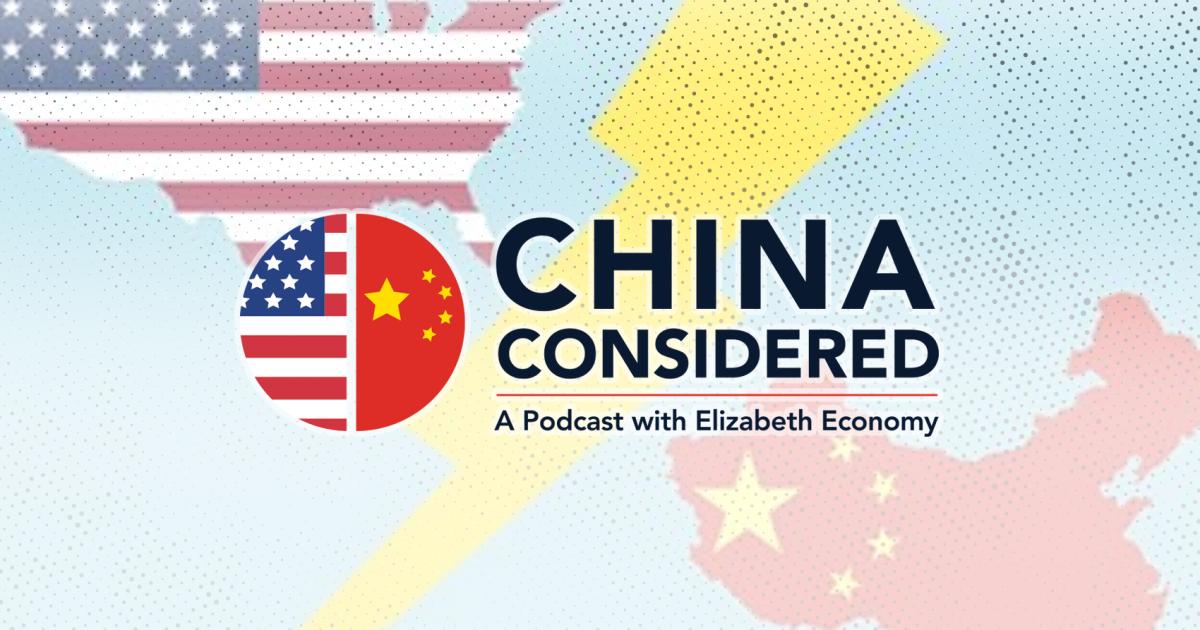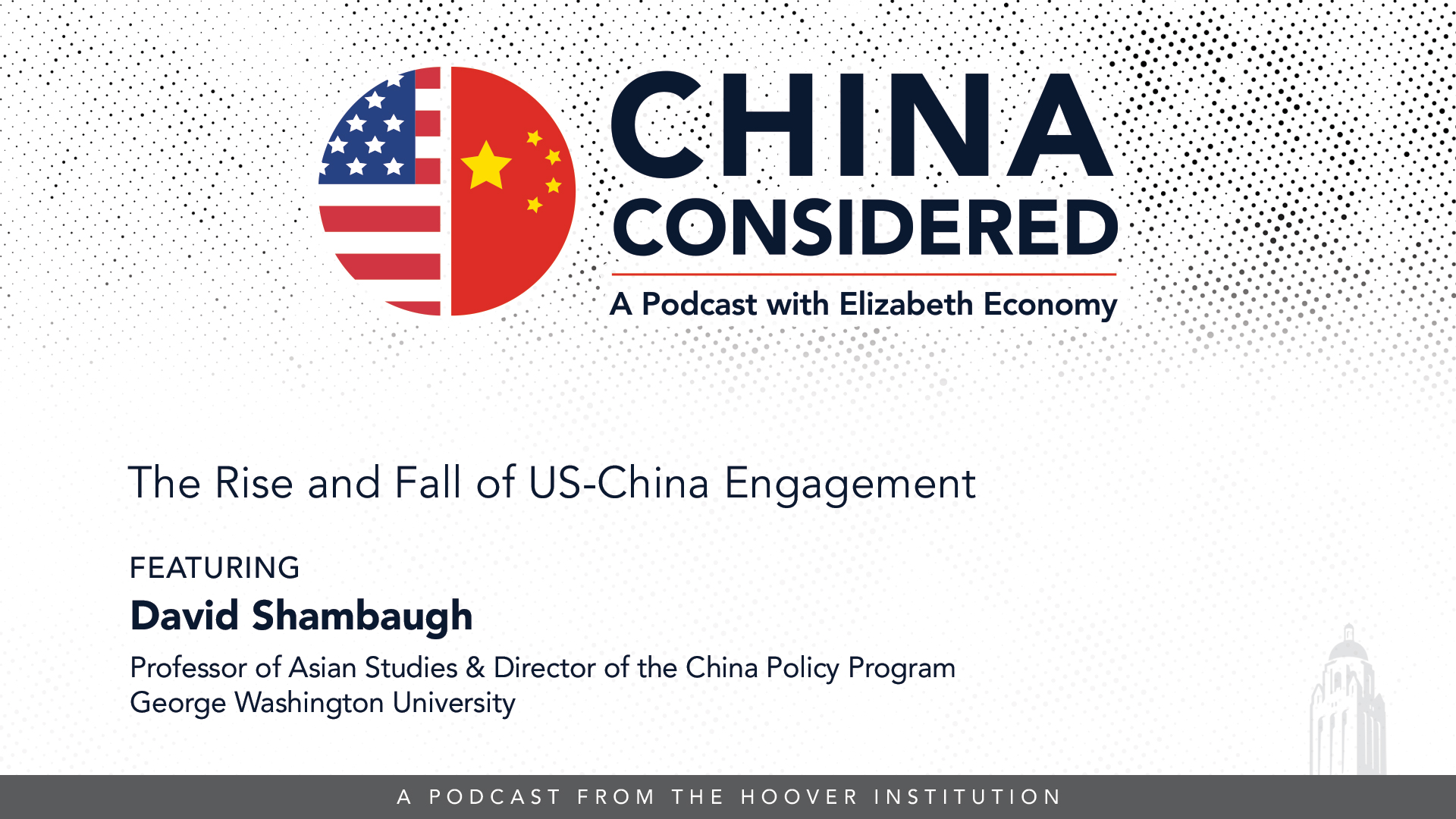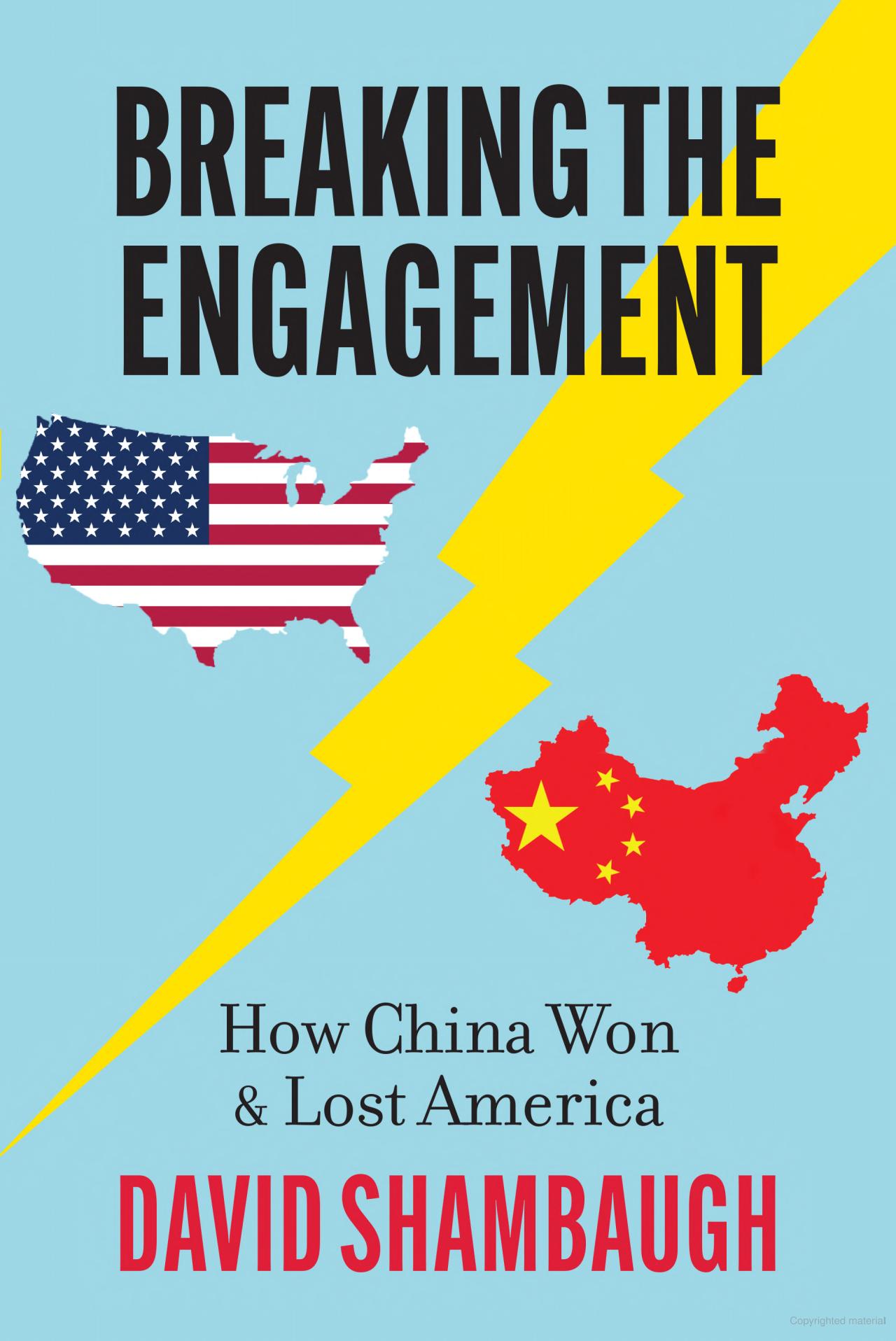- China
- US Foreign Policy
- Confronting and Competing with China
Dr. Elizabeth Economy interviews Professor David Shambaugh about his new book Breaking the Engagement: How China Won & Lost America, which examines the collapse of America's four-decade engagement strategy with China. Shambaugh argues that China initially "won over" American constituencies during the reform era, but starting around 2010, these groups faced increasing obstacles in China, leading to the breakdown of the "engagement coalition." The conversation explores the five schools of thought dominating current US-China policy debates and Shambaugh's assertion that the relationship has shifted to "indefinite, comprehensive, competitive rivalry." Drawing on his experience as both a leading China scholar and a former government official who witnessed key moments like normalization in 1979, Shambaugh offers insights into whether this dynamic can be managed to prevent further escalation.
Recorded on July 9, 2025.
WATCH THE EPISODE
>> Elizabeth Economy: Welcome to China Considered, a podcast that brings fresh insight and informed discussion to one of the most consequential issues of our time, how China's changing and changing the World. I'm Liz Economy Hargrove Senior Fellow and Co-Director of the program on the U.S., China and the World at the Hoover Institution at Stanford University.
Today I am delighted to welcome my good friend, Professor David Shambaugh. David is the Gaston Seeger Professor of Asian Studies, Political Science and International affairs at George Washington University. He's also the award winning author or editor of 35 books, including his most recent book that we'll be discussing today, Breaking the How China Won and Lost America.
David, welcome.
>> David Shambaugh: Hi Liz, good to see you. Be with you.
>> Elizabeth Economy: So you've been studying China since the 1970s when you were a college student. That's really before I think China became such a hot topic in international relations or such an important part of the US Foreign policy discourse.
What drew you to study China at that time?
>> David Shambaugh: Well, I was an undergraduate at that time at the University of New Mexico in Albuquerque, and I had a little bit of previous exposure to China, you might say, in that my older brother had been in the American army in Taiwan and I spent a summer with him, gosh, the summer of 1960 in the middle the height of the Taiwan Straits crisis.
So I had a kind of subliminal memory of Taiwan anyway in Hong Kong, although obviously never been to the mainland. But I found myself as an undergraduate at University of New Mexico and I took a course called the Chinese Revolution and Maoist Thought, taught by a fiery Marxist professor.
And I took a history class from a cultural historian on modern Chinese history. So between those two, I was sort of intrigued. And then I took a gap year between sophomore and junior year, went around the world all the way. And when I got to Hong Kong, in fact, I met a British person who had just come out of so called Red China.
Turns out she'd only been up to the Guangzhou Trade Fair. But that intrigued me. So I took the train up the next day to the border to Lo Wu and looked at all this, you know, miles of barbed wire fencing to keep the mainlanders from escaping to Hong Kong.
And I it kind of puzzled me what is going on on the other side of these fences. Turns out that's where Shenzhen is today. Then it was just rice paddy. So once I returned to New Mexico, I decided I really wanted to study China. And that's not the place to study China.
Latin America, yes. China, no. So I transferred to George Washington University and completed My undergraduate and East Asian Studies there, that was the origins of my interest.
>> Elizabeth Economy: Stay with your brother and then a later trip. And so just out of curiosity, when you were at the University of New Mexico and you took that college class by the fiery Marxist, were you at all persuaded by the Marxist sort of thinking?
Did it sound attractive at all at the time?
>> David Shambaugh: Absolutely. I think I might have even considered myself a Marxist at that point in time. I was very inclined towards [COUGH] Maoist thought and Marxist socialism. And this fiery Marxist professor who'd done his own PhD at Berkeley, he tried to simulate the Cultural Revolution, or part of it in our class.
We had small group criticism sessions. And so, yeah, I was taken by the whole Maoist experiment. And then I got to gw, which was just the opposite end of the intellectual spectrum. This was the Institute of Sino Soviet Studies, which is very Cold War ish. And I studied under some very significant professors, Franz Michael, Gaston Seeger, Harold Hinton, William Johnson.
But these were individuals who were to the far right on the China political spectrum in the United States. So I went from far left to far right. It was rather jarring experience, but that's how I got started.
>> Elizabeth Economy: And then you ended up at Michigan, kind of in the middle, maybe, right?
>> David Shambaugh: Well, interestingly, I actually between George Washington and Michigan. I first worked for about two and a half years in the government, first in the State Department for about one year. And then I met Michael Oxenberg and he was in the National Security Council then, in charge of obviously China, but also Indochina, which is how I met him because I was the Indochina desk officer in the Bureau of Intelligence and Research at INR in the State Department.
And he asked me and shocked me and said, how would you like to come over to the White House and be my assistant? And I almost dropped my coffee at the time and said, well, yes, of course. Long story short, I went over to the NSC 1977, 78, and worked for Mike on a variety of issues.
Many China related in the lead up to normalization. It turned out a lot of the pieces of the moment.
>> Elizabeth Economy: Yeah, this is kind of only second to, you know, 1972. This is really, you know, the pivotal moment in the relationship. And you were there for that, working on this issue.
Wow.
>> David Shambaugh: Yeah, a lot of export control work and claims assets and what to do about Taiwan. We were drafting what turned out to be the Taiwan Relations Act. We did a lot of, you know, sort of build. Building block, foundational things that would have to be put in place come normalization of relations in 1979.
And I stayed there right until January 79. I met. I was on the South Lawn of the White House when Deng Xiaoping came. I met Deng three times on that visit. And then I returned to graduate school. I went to Johns Hopkins SAIS for two years for an MA while Oxenberg was still in government, waiting.
He then asked me if I wanted to go out to Michigan to be his student. I said, well, yes, but know he said, I'm not going to be back for two years. So, long story short, I went to Seiss where one of my immediate classmates and good friends was Nicholas Burns, the most recent American ambassador to China.
So we, Nick and I have been friends for that many years. But then I went to Ann Arbor and started my PhD under Alan Whiting and Mike Oxenberg and others at the University of Michigan.
>> Elizabeth Economy: Wow. So, you know, I think it's one of the things. And I wanna talk about your most recent book, which is so terrific.
I think it's one of the things that comes through in the book is that you've actually lived history. You know, you've lived the history of the US China relationship, both as a preeminent scholar, but also, you know, in the policy space and through your sort of think tank work.
In addition, you've worn many different hats and I think you brought them all to bear in a really fascinating way in this book. So let's talk about the book a little bit first. Why did you decide to write it? I know there must have been something that you impelled you written 35 books, written or edited, I guess, 35 books.
And I'm sure with each one there was something that drove you, a question or an issue, something that's made you sit down and say, I've got to get this out.
>> David Shambaugh: Well, I have been teaching us China relations for more than 30 years. I have an annual graduate seminar on the subject.
And I've been puzzling every year in that seminar with what are the sources, the drivers of this relationship and the sources of the fluctuation in the relationship. This has been anything but a smooth, constant relationship. It's just oscillated wildly from amity to enmity, back to amity to enmity, what the late great China historian Warren Cohen called the love hate cycle in U.S China relations.
So that puzzled me. That was sort of a bigger. Question. And I've wanted to sort of explore historically in the first half of the book, which we can get into is the historical part of the book. Then the other puzzle that I've grappled with is more recent and contemporary.
Why, after four decades of engagement and entwining of the two societies and governments over the last decade, why has it unraveled to the point of today? So those were the two kind of motivating questions that animated me to try and tackle this during my sabbatical year.
>> Elizabeth Economy: So let me ask how you understand engagement because, you know, different, different scholars have different understandings of what the United States has meant when it's talked about engagement over, you know, the course of the decades that we've sort of had this approach or policy or people may say it's a strategy.
And did you see it change in terms of the definition and the understanding across administrations?
>> David Shambaugh: Well, it has evolved. But I would say, and I argue in the book, that it's had some core elements across what, eight administrations, from Carter through Obama. And there is no, Liz, there's no kind of secret master document in the American National Archives in Washington.
This is, this was the engagement policy. But if you look across those many administrations, there are, I think, four core elements. And just very quickly they were there was strategy of engagement, then there were tactics to implement the strategy. The strategy itself had, I argue, four elements. First, to help China modernize economically and technologically.
Second, to liberalize China politically. Third, to socialize China into the international liberal order, to integrate China, which was outside the institutional order, as you know. You've written enormous amount about that. You wrote a book with Michael Luxembourg called China Joins the World about that very process. Anyway, that was the third element.
And the fourth element I call engagement as process, where the two sides, governments and elements of society would exchange with each other. That's how most people think about engagement, simple exchanges. Well, yes, that was a, I would argue, a tactic, but the tactic was to support the first three goals.
There were other tactics, too. You know, marrying the two national governments bureaucratically together, trying to foster civil society in China, trade and investment with China, trying to help China build the rule of law according to sort of Western legal norms, educating Chinese students in the United States in a variety of fields so that they would go back and help modernize their country, but also liberalize their country.
So I'd say that was the these were the that was a strategy and some of the tactics that the US has been pursuing, really, for 40 years, until 2017.
>> Elizabeth Economy: Okay. But let me just push you a little bit. I mean, was. Was modernizing China the objective in and of itself or.
Or the process the objective? Or what did the United States have in its mind? If you were to look back across, you know, what various secretaries of Spanish state or even presidents talked about, when they talked about what it was that we were trying to achieve, I think you sort of came out there toward the end.
There was an element of liberalizing the country. Right. Liberalizing economically and politically, right? And having China, as I think you're suggesting, become what Bob Zelick talked about, right? A responsible stakeholder in the international system. Some people say it was never the US intent to have China transform or to move toward democracy.
Are you in that camp, or do you think there was that element of it?
>> David Shambaugh: Well, I very carefully use the word liberalize rather than democratize. That's very intentional because I don't think any serious American has ever thought that the Chinese Communist Party was going to democratize, as we know, democracy.
But the reason the first half of the book is historical is because I wanted to dig back into previous administrations, not just to Carter, but I go back all the way to Truman, Eisenhower, Kennedy, Johnson, and to see what the antecedents were for the engagement strategy. And I have unearthed, I think, and dug out each of those presidents all the way through to Obama, what they had to say engagement was for to those three elements.
Integrate China into the international order, liberalize it politically, and help contribute to its modernization. That, now it goes back to the 19th century. That's not a recent goal of the United States. It goes back to the Qing dynasty, and all the way through the Republican era, the United States has been trying to contribute to China's modernization.
And then when Oxenberg, he's explicit about it, as was Carter and particularly Reagan. And I find quotations in various speeches and documents from every administration from. From Carter, Reagan, the two Bush administrations, the two Clinton administrations, and the Obama administration, which very specifically explicitly talk about liberalization, modernization, socialization, and the international integration dimension.
So it's not just. That's my hypothesis, but I find empirical data points across many administrations to support it.
>> Elizabeth Economy: And do you have a sense for, if you were to look back across the AID administrations that sort of consciously had this as a strategy, you know, is there one that stands out to you as being particularly successful?
Do you see a period in which the United States was, you know, really made a lot of progress with China, recognizing, of course, that it takes two to dance. Right. And it's not all about what the United States is doing. It has to have a receptive China on the other side of things.
But is there a period that you would consider to be sort of the golden era of engagement?
>> David Shambaugh: Yes. I would identify the Reagan. Ironically, the Reagan administration. I say ironically because, as we know, Reagan, when he became president, was a stark anti communist. He campaigned on overturning the normalization of relations with China and restoring diplomatic relations with Taiwan.
But after one year in office, he was in office from 81 to 89. That those eight years were the, you know, sort of heyday, you might say, golden era of engagement. And the Reagan administration actually completed what the Carter administration had envisioned, I would argue the institutionalized the relationship at the governmental and the societal levels.
And so all the pieces of engagement were put in place during those eight years, I think that was the sort of golden era, you might say.
>> Elizabeth Economy: I remember reading a quotation at one point by Reagan where he said we should simply give our technology to the Chinese to help them develop.
Sometimes it makes me laugh. And I think, can you imagine any president today saying something, you know, along those lines? I don't think so. So talk a little bit about the level of Chinese receptivity to engagement and, you know, how did China actually leverage US Interest in those sort of elements that you discussed, the modernization and the integration and the liberalization?
How did they react? How did they use it? You know, did they, you know, face problems because of it? Did it challenge them? in ways. What was the sort of the response on the other side?
>> David Shambaugh: Well, the, the Chinese, you know, grand strategy, if you will, after dung, from dung onwards, it goes all the way back to the Qing dynasty again has to be wealthy and powerful modernization.
So to the extent that any foreign country, including the United States, could contribute to China's economic and technological modernization, they would take it. This is the, you might say the kind of the genius of the Chinese communists. And they're very eclectic and taking bits and pieces from different systems.
But for the United States, they saw, you know, the most modern country in the world, which they wanted to emulate in many ways. And so it was pushed for the Chinese, pushing on an open door. The Americans were offering them all of these opportunities, sending millions, hundreds of thousands, millions of students to our country for professional training, foreign direct investment.
The United States has been, I think over time, the number one foreign direct investor, about $100 billion a year until last two or three years, trade, science and technological cooperation. But it also afforded opportunities for so, you know, shall we say, more nefarious elements of China's modernization. Intellectual property threat theft, forced technology transfer, espionage and, and theft of military technology, some very advanced military technologies, you know, nuclear warheads, high end fighter planes, et cetera, et cetera.
So, you know, engagement offered the Chinese an incredible opportunity at technological, economic modernization.
>> Elizabeth Economy: Does it seem surprising at all? I mean, if you look back and you think here the United States was with this policy of engagement and, and you know, sending our companies out, welcoming Chinese students here to, to train and to learn that China would steal military technology?
I mean, was there an element of that where we were still militarily, where we didn't trust each other, where we were security competitors even as we were, you know, economically, our trade relationship was, you know, booming, you know, during, you know, the past, you know, four decades, again, up until recently, I mean, does it seem a little, you know, anomalous?
>> David Shambaugh: It does. And again, in the early in the 1980s, prior to the Tiananmen massacre, part of our America's efforts to modernize China included military modernization. We were exporting various weapons systems, not just technologies to China. The embargo on COCOM had been relaxed and then came Tiananmen. And from then on, the military component of America's assistance to the Chinese modernization was hived off, you would say, to this day.
But other areas continue to pace. After about 1995, there was a sort of five year hiatus after Tiananmen, but the military side was frozen and has been to this day. But The US has been more than, I don't want to give the United States credit for this. In a sense, China's modernized their own country, let's be clear about that.
And the Europeans and the Japanese and the South Koreans and many other countries have been involved in this process. In fact, engagement wasn't just an American concept, it was adapted by many other Western and Asian. Asian countries,
>> Elizabeth Economy: of course. And I was just thinking about that separation you mentioned that the military security element was hived off, but with, you know, current, with, you know, Xi Jinping's policy of the military civil fusion.
Right. They have found a way to utilize technology and technology that's transferred for commercial purposes. Right. For continuing their, you know, advancement of the People's Liberation army as well.
>> David Shambaugh: That's right. If one studies, you know, military modern.
>> Elizabeth Economy: You have done, I mean, you're also, let's face it, you're also one of the original experts on the People's Liberation Army.
When did you publish that book that you wrote? It was,
>> David Shambaugh: gosh, that was called
>> Elizabeth Economy: years ago. Right?
>> David Shambaugh: Modernizing China's Military. It was in about 2000. It's after I returned from England to, to the US around 2000, 2001. So I spent 20 years of my life studying the PLA and in those years it was very interesting.
There was no, what, no spin on from the civilian technological sector to the Chinese military sector. Whereas in many other countries, the United States and others, that's very common. Technologies developed in the civilian sector are adopted, adapted for military ends. So that was one of the reasons China, the pla had such a hard time modernizing.
There was no spin off and there was very little spin on and there was no very little spin off from the military sector. In fact, China's military industrial complex was very backward in those years. So, but, so they've only fixed that really in the last decade and now we see the results.
They basically have a self reliant, independent military industrial base. They don't even rely on the Russians that much as they used to. And they're becoming a significant supplier to other countries in certain weapon systems.
>> Elizabeth Economy: Yeah. And they're out there training, doing military training with, you know, officers from, you know, many emerging and middle income economies.
And in some respects, you know, emulating what the United States has done, established their first military logistics base. Right. In Djibouti. And yeah, there's, they're, they're on, I think on the cusp, I think they've transformed the military already in terms of the technology. I think they're on the cusp of really becoming a global military player as well in, in ways that are pretty fundamentally different from what was before.
Because I'm pretty sure, correct me if I'm wrong, that up until about 2010, 2011, it was PLA doctrine that they would never have overseas bases. Wasn't that sort of the, the rule that they were never going to be hegemonic, you know, the way that the United States was?
>> David Shambaugh: That's right, I think it was Chairman Mao who said had something called the three nos. No overseas military bases, no debt, international debt. That's one lesson he learned from the Sino Soviet split. And I forget his third. No, but they now have. Well, they have one military base, of course, but I would still note that you're right.
They are beginning to train and have, you know, African, Middle Eastern, some Asian militaries, but they are not in the league of the United States at all. What's known as security assistance. There's weapons sales. Yes, they're selling weapons, but actually training personnel. They don't do that much of it.
They have an annual course at the National Defense University in Beijing. But compared to what the United States does worldwide, they've got a very long way to go.
>> Elizabeth Economy: Yeah, no, I do remember reading something about PLA officers actually in the Philippines during the Duterte period where some of the Philippine military officials were talking about the contrast between the, you know, sort of professionalism and how advanced the US military was compared to the way that the Chinese were trying to train.
And anyway, it was just an interesting, interesting difference. So to your point that they're not quite in the same league yet. But, you know, I think if we've seen anything coming out China over the past decade and. And bit it's that you blink, and they've kind of changed the landscape and are right there with us, challenging us, and competing with us in new ways.
So let me go now to the. I want to talk about the book in some more depth. And, you know, the subtitle of your book, which I love, is How China Won and Lost America. So talk to us about what that actually means. It's clever. I think it plays against the, you know, trope from the 1950s and 60s about how the United States lost China.
Right. And so now you've kind of flipped that on its head. So what does it mean? How did you end up with this?
>> David Shambaugh: Well, I first have to credit you, Liz, with encouraging
>> Elizabeth Economy: that. Of course.
>> David Shambaugh: I had come up with that as a potential subtitle.
And then for a period of time, I was thinking about discarding it. You encouraged me to keep it.
>> Elizabeth Economy: Yes, I do.
>> David Shambaugh: That was the lost part. But what I then began to realize is if you lose something, you have to have won it in the first place.
So I realized that the argument of the book really is that during the reform period, from Deng Xiaoping onwards, China won America proverbially over different constituencies within the United States. The U.S. government, the business community, the academic community, you know, farmers, various elements of what I call the Engagement Coalition, they all found a place in Engagement for themselves.
The elasticity, you might say, of Engagement was its beauty. It had a place for many American actors, and they all went into China physically and otherwise. So it was in those decades in the 80s and the 90s, despite Tiananmen, into the 2000s, where China sort of won over these constituencies.
That was the winning part. But in the last decade, I argue, or more than last decade, in fact, beginning around 2010 or so, each of these constituencies and their own constituents in their own ways, encountered difficulties with their Chinese counterparts in China. The business community, the academic community, US government as NGOs in particular, which you've written a lot about, all began to run up against different obstacles.
And Chinese just began to make it very difficult for different American and Western, including West European actors to operate in China. And one by one, I argue in the book, these constituents peeled away or peeled out of the coalition, and the coalition essentially crumbled. And then Donald Trump came to power in 2017.
He just accelerated the crumbling, the atrophy, if you will, during his four years. So that's when Engagement died, and that's when China lost America. Beginning in 2017, I would argue, right on through the Biden administration. And it's still, we can talk about this. It's a little unclear the second Trump administration exactly where they're going with China policy, but engagement.
Humpty Dumpty is not going to be put back together again in my view.
>> Elizabeth Economy: Yeah, so let me ask you, do you think that the Chinese, and so you date this a little bit before. I tend to, in the sense that I tend to look at Xi Jinping as the sort of the, mostly the inflection point for when policy really changed.
But let's take your 2010 moment. Do you think it was a conscious strategy of the Chinese leadership at the time to, you know, sort of make it more difficult for US Business to do business, to make it more difficult for US and other multinational. I should say it's not just the U.S. as you mentioned earlier.
It's multinationals writ large. It's NGOs, you know, international non governmental organizations writ large that found it more difficult to do business in China, particularly after 2017. Do you think that there was a strategy here or was it just one off policies that accumulated over time and made China that much less attractive and frankly less interested in engaging with the United States and the west more broadly?
And do you think that there was debate around this? People were saying this is a mistake, I see what's happening. People like us in China, you know, were they writing things like we're making, you know, a big mistake here by, you know, this set of policies or that set of policies?
>> David Shambaugh: Excellent question. And just coincidentally, I was, we, we all date the, these policies, these more repressive restrictive policies of the Chinese side to the Xi Jinping era, which began in 2012. We're now in year, what, 13, 14 of that. But I date them to 2010, 29, 10.
And just coincidentally, I was living in China that year. I was a senior Fulbright Scholar at the Academy of Social Sciences. Not my first time at Cass, actually my sixth time. I was, I've been a resident fellow in, in, in different institutes, six different institutes, but I was in the Institute of World Economics and Politics that year.
And so I personally kind of experienced it in the academic realm. I mean, they did not do much to help my research, quite. In fact, they went out of their way to impede it. And I wasn't the only foreigner in American that was experiencing that in the scholarly domain.
But I interact with a number of for nos. Good friend of mine was the head of the Ford foundation at the time. They were feeling it. Other nos were feeling it. The American business community was beginning to feel increased obstacles and pressures. So it was really that the fall, fall of 09.10, which we now look back on, we call that China's Year of Assertiveness.
China went out and started to pick fights with all of its neighbors, Japan, India, the Philippines, Australia. And so, you know, each of those, I don't think, to answer your question, there was some conscious strategy. The Chinese leadership didn't get together in Jongnan High and say, okay, let's go out and alienate all of our neighbors and while we're at, let's go to Copenhagen and alienate the European Union and the United States of the climate Change conference too.
No, I don't think it coordinated, but these, these independent dots, you know, created a pattern that year which we in the Chinese foreign policy world refer to as China's Year of Assertiveness. It comes in the back end of the, of the financial crisis, global financial crisis, and the Chinese and the Olympic Games, where I was actually with my son.
So they got through the Olympics, they were feeling really good about themselves. In the global financial crisis, they were feeling even better about themselves. Really hubristic, you know, so they decided for whatever reasons to undertake all these activities. But it added up to a qualitative shift. And it was two years, it was last two years of Hu Jintao's reign just before Xi came to power.
And then she just doubled down from then 2012 on.
>> Elizabeth Economy: Yeah, I mean, I see. I definitely take your point on the sort of external assertiveness. And I remember learning that Xi Jinping was in fact the head of the small group that was dealing with the South China Sea within the Chinese leadership in that 2010, 2011 period when you did start to see so much more assertiveness coming out of, of China.
So in my mind, I thought, well, there you go. Wherever his hand goes, you're gonna see more challenging behavior coming out of China. But I also remember in 2010 that, you know, there were 180,000 protests in the country that were documented. And it was still a time where the Internet was quite vibrant and interesting.
And so, maybe both things were true at the same time. You know, a little bit of still openness on the domestic front, but again, increasing assertiveness and challenging behavior on the global stage. Okay, so that's how China lost America. Do you sense, you know, now in terms of, you said, Xi Jinping has doubled down.
We've seen it a couple of different points where there he seems to be, or the Chinese leadership seems to be reaching back out to the United States or reaching back out to Europe to try to engage. To say, we're open for business, come back, what do you think is the reality of that?
Are you seeing the kinds of changes on the ground that would, you know, give life to that kind of rhetoric? Do you think it is just rhetoric? What, what do you think is the calculus? You know, as we've seen China, you know, not that long ago, frankly, even when I was just in the administration working for Secretary Raimondo, they were really trying to get US business back in China.
Do you think that there's a rethink underway in Beijing?
>> David Shambaugh: That's a good question, I don't really see a lot of evidence for it, it's more rhetoric. There has been a rhetorical outreach, you might say. You know, they say they're reforming this regulation and that law, and they're open for educational exchanges, this and that.
But actually, if you look at, at it on the ground In China, foreign NGOs have no greater opportunities than they've had. Foreign companies are still running up against even greater impediments. The US Government and consulates, they can't even schedule a meeting with Chinese counterparts or very great difficulty, you know, just having normal interactions.
Scholars, scholarly exchange. We have only 800American students in China today. Used to be 20,000. So you can just go through sector by sector by sector. The Chinese are not, in fact, welcoming rhetorically. They say they are, but their words and their deeds are not congruent with one another, in my view.
>> Elizabeth Economy: I think maybe that Xi Jinping thinks things are working reasonably well the way they are. Right. That he doesn't need actually to change Chinese behavior because actually his model, or the model of, of the current Chinese leadership is doing exactly what it needs to do right now.
So I don't know, do you agree. With that, or, or
>> David Shambaugh: I think that there is. That's a. It's a good hypothesis, and I think there's a lot of truth in it that he's believes that his Various policies and strategies are working. The global Circulation strategy, the Indigenous Innovation strategy, the counter Peaceful Evolution strategy, and his diplomatic strategies with different parts of the world, with Southeast Asia, with Latin America.
We'll see shortly when the Chinese and the EU have their summit later this month about that piece of the world. But I think Xi, I think you're right, I think Xi Jinping believes it ain't broke, don't fix it. Their strategy is working. I think from his and the regime's perspective.
>> Elizabeth Economy: Yeah, and to the EU summit. I'm sure you've seen that that does not look to be set for a resounding success at this point. I was just reading that the Chinese either are planning to or have already canceled the second day. And the Europeans have been quite critical of China in the run up.
So now it's down to a one day summit and they apparently canceled the economic discussions that were supposed to take place in advance. So, so I, I guess, you know, that's not looking like it's going to, to lead to a big shift, positive shift in the China EU relationship.
So one of the things that I really enjoyed about your book was your discussion of the state of US scholarship or, or on China or China analysis. Why don't you, if you can just share a little bit of your thoughts on the strengths and weaknesses of the academic and think tank world and government world and how it's analyzing and understanding and trying to understand China, what, what's working and what's not working.
>> David Shambaugh: Well, thank you for, for asking. I, ever since I wrote my doctoral dissertation at the University of Michigan on China's America Watchers 40 years ago, I've been a watcher of watchers. Not just Chinese watchers, but foreign, foreign China studies and Russian Studies and other. I've just been interested in how fields in international subfields within international relations sort of evolve.
So I've been a watcher of watchers for a long time and I decided to include this chap in the book called the Great American China Policy Debate, which is still ongoing. It's been ongoing really since about 2016. 17. There was a previous debate which I describe in an earlier chapter on the Did Engagement Fail Debate.
That was a more finite debate that ran about two years. It was kicked off by an article by Eli Ratner and Kirk Campbell. But then after that debate there has been a much longer running one on what should American China policy be. So I, I, I look at the, those who've contributed to that debate and I put them into five different schools of thought.
And these are mainly individuals who turns out are in think tanks. The American academic community, it has to be said, are not really participants in this debate. The American I've written about this elsewhere, you know, American Sinology or American China Studies I should say, has become so granular and it's not very policy oriented.
So save a few individuals, the academy is not really a participant in the national debate on China policy. It's largely driven by people in think tanks or other private sectors, organizations. Anyway, I put these authors and I only look at published materials. That's the empirical basis, not op EDS so much, but you know, substantive articles and books.
And I place them into one of five schools. Just quickly let me take them off for, for you and those who are listening. The first school I call the stealthy, stealthy rival school. This is a group of individuals who believe that China has a kind of secret grand strategy to undermine, overtake and repl the United States as the world's principal power.
And for this school, all the dots of China's behavior internationally and domestically connect. And there is this sort of grand, grand plan towards that end. Then I have a second school. Let's see, I call the comprehensive competition school in which I would place myself, and the term defines itself, that the United States and China are in competition across a variety of functional domains.
Economic, technological, political, ideological, global governance, higher education, software. Power, you name it, the two are competing. And competition is different than an adversarial relationship. We're not yet fully into an adversarial relationship in these domains, but competitions just as it is in sports, you know, each side is trying to gain advantage vis a vis the other, and each side is playing defense against the other.
And it's kind of a continual process, a soccer match with no end and no overtime, there is no winner. This is a perpetual process. I describe in the book. I call it our relationship is now one of indefinite comprehensive competitive rivalry. It's gonna go on indefinitely. It's a classic great power rivalry.
It's competitive across all these functional domains comprehensively and so on. So that's the second school. Then thirdly, I find those I call the Re Engagers, the RE Engagement School. And not surprisingly, these are individuals who are big particip, major participants in the Engagement School previously, and they have devoted their careers, many of them in the US Government and the State Department and the private sector, mainly in the business community, to engagement.
And they believe that it's the United States that has actually broken the engagement since Trump and that the United States should simply get back to engagement. They argue that China is not a competitor, not an adversary of the United States, and the US Just needs to kind of take a deep breath, re extend the hand to Beijing and reengage.
So that's a group of individuals that I discern. And then last two, quickly, next school I call the Strategic Empathy School, which is somewhat related to the Re Engagers. This is a group of individuals who argue that China is reacting defensively to American aggression and assertiveness and as America is the, you know, aggressive party here, and that China is naturally trying to defend itself and that therefore the strategic empathizers argue America needs to understand China's insecurities, not provoke them, not demonize China, and to be more strategically empathetic with China.
So it's viewing the relationship through China's eyes. That's the fourth school and last school I call the Managed Competition school, which is very characteristic of the Biden administration, even though I'm the first one.
>> Elizabeth Economy: That was, in fact, what the Biden administration called its approach. I think that that term was actually used by maybe Tony Blinken, but go ahead.
>> David Shambaugh: Yep, no, but I have intellectual property rights over that term, I first used it.
>> Elizabeth Economy: Let him know.
>> David Shambaugh: 17, you can let Blinken and Sullivan know. I don't care who. But no, I. The point is that competition is a reality. It's an indefinite reality. It has to be pursued and assertively so by the United States.
But competition is not an adversarial relationship and we don't want it to become such. Hence it has to be managed through dialogues and other confidence building measures and even some of the tools taken from the first Cold War toolbox during the Daytone period between the United States and the Soviet Union.
So the managed competition school, which I also put myself in, so I'm in comprehensive competition and management
>> Elizabeth Economy: too, because I. Was going to say, you know, do you not see yourself in that, in that bucket as well? So okay, you can in two different schools of thought.
Okay, good to know.
>> David Shambaugh: That's how I the American debate.
>> Elizabeth Economy: So okay, given sort of those five schools then, you know, there's been a critique made by a number of our colleagues, mostly in the sort of academic world, not in the think tank world, that there's groupthink in Washington and that it's very difficult if you're, if you fall into the strategic empathy group or the re engagement group.
It's near impossible to have your voice heard because there is such group think. Do you subscribe to that notion? Do you think that there's no space that there's a kind of one narrative that's accepted in Washington?
>> David Shambaugh: Well, I would say that there is a predominant narrative in Washington, but I would say there's a predominant narrative across the land.
It is not just inside the beltway, it's outside the beltway. You know, there's a reason that 83% of Americans have an unfavorable view of China. 42% identify China as an enemy, 52% identify China as a competitor, while only 6% see it as a partner. So I would say this is a, there is a, I would argue there's a national consensus about China and it is about the competitive, you know, so it's not just an inside the beltway.
So there are those who argue for reengagement, strategic empathy. They are in my view the outliers. They are the 6%. Their voice is valid voice. Everybody has a valid voice. But they are such a minority compared to the broad, I would say consensus across the country of not just experts and foreign policy people, but Americans on, on China as a, as a serious competitor that has to be dealt with.
So you know, I commend, I'm not going to name any names, those who have tried to find their voice within this dominant hedge. You might call it a hegemonic discourse. Yes, there is a hegemonic discourse in the United States, around China as a.
>> Elizabeth Economy: Yeah.
>> David Shambaugh: So the strategic empathizers and the re engagers are having a hard time getting their, their, their voices heard because there's not a whole lot of evidence to support their positions in my view.
>> Elizabeth Economy: Yeah, that's probably what I would, I would argue as, as well. So let me just come back for a second because you put yourself in the two buckets of comprehensive competition and managed competition. I mean is there a different outcome for the comprehensive competition bucket other than managing that competition?
You said there is no winning. So do you end up anyway if you believe in comprehensive competition, do you end up anyway having to manage that or is there something different that can come out of it?
>> David Shambaugh: Well, if it's not managed it then it becomes a fully adversarial, much more zero sum dynamic.
I've thought a lot about this, about competition. I've done a lot of reading into the literature of competition in different fields. But competition is just that the way I think of it. It's just that it's not fixed, it's fluid, it's dynamic. Each side. As I say, I sports, I love sports, but I, I see a lot of analogy between teams, right?
They one's on offense, the other's on defense. You have to, if best defense is a proactive defense, you try and control the pace of play on offense. So the meta sports metaphor may be stretched, but there is no winning. As I say, there's no overtime. And this is an indefinite state.
And we, we, Americans and others, Europe have, and the Chinese for that matter, have to learn to live with this as the new normal and keep it bounded. That's where the management comes in. Because if we fail at the management then we really have a cold war. I don't think we're in a Cold War 2.0.
There are some elements, but we're not quite there yet. But competition can indeed bleed into a fully adversarial cold war. And cold wars don't always stay cold.
>> Elizabeth Economy: Now I know you mentioned, and you have mentioned that you don't certainly like prognostication, but maybe just a quick assessment then of whether or not the two sides right now are managing the competition well in your estimation and if not, what would you say would be needed to get the relationship back?
In a sort of on a more constructive path.
>> David Shambaugh: You know, very fair question. We're in a kind of strange hiatus at the moment, I would say in the first six months of the Trump administration, because the administration has yet to unveil and roll out their China strategy other than their tariff strategy.
This has become a single dimensional relationship. Save a few other data points. Yes, Secretary of Defense Hexath and even Secretary of State Rubio have made some hawkish statements that, that suggest where, that the relationship is kind of a continuation of Trump 1.0, but it's an odd hiatus period.
So I'm not going to say that they're doing things right or wrong yet. There aren't, they're not managing. There's no management at the moment. The Rubio hasn't even met Wang Yi once, Heth hasn't met his counterpart. The bureaucratic institutionalization dimension that I don't know, I guess says except for the trade talks in London and Zurich where Secretary of Commerce and treasury met their counterparts, there's no high level institutionalized interaction at the societal level.
At the military level, you know, there are a few things going on, but this is a very odd, odd kind of period. It makes me a little nervous. We need to, the Trump administration needs to figure out their strategy, unveil it, which as soon as the tariff issue is put behind them, so to speak, whatever they, they think is, is acceptable, then they will move on and, and unveil a much more systematic policy.
And that's a question where the management piece of that comes in. We'll have to wait and see.
>> Elizabeth Economy: So you're expecting that they will unveil a more comprehensive, more strategic policy?
>> David Shambaugh: Absolutely. And there are already some indicators of it. And, you know, the press guidance has been given to the spokespersons of the White House, National Security Council, State and Defense Departments, et cetera.
Some of the things Rubio has said, some of the things Heath have said, there are the components of a more systematic strategy there. Trump himself is the wild card. It's, you know, and we can talk about that, but I think we're, we're not, they haven't unveiled their, their policy.
But, you know, I think they're trying to shift various assets to the Indo Pacific. China is there, you know, kind of the pacing threat, as Hexeth has said, the Secretary of Defense. This is the driver of the Trump administration's international diplomacy, international security, commercial policy, et cetera. So they just haven't articulated it yet.
But I think that's where they're headed.
>> Elizabeth Economy: Yeah. They haven't articulated and it's not clear to me they're putting in place the right building blocks with our allies and partners. If, in fact that is going to be the strategy for what we're looking at is largely return to Trump 1 and in many respects the Biden administration policy as well, you know, what they're doing on the trade front and the talk about increasing defense spending and the threat threats don't seem to be particularly conducive to, to sort of strengthening our our relations with our allies and partners.
Although I do agree with you, I think, that both Secretary of Defense Hexath and Secretary of State Rubio and former National Security Advisor Waltz had as their inclinations to do that. I think they're all more traditional Republican internationalists. But I also agree with you that Trump is the wild card.
President Trump is the wild card in all of this. So let me ask you one more sort of bigger question, and that is if you are sitting in China and you have, as you've noted, spent a lot of time in China, a lot of time in the Chinese Academy of Social Sciences and certainly meeting with university professors, I'm sure in Beijing and Shanghai and Guangzhou and elsewhere, if they were to read your book, and I'm sure it probably has already been translated informally into Chinese, I have no doubt at this point there's some bootleg copy because I'm pretty sure, you know, the Beijing Foreign Language Press is not going to be translating it anytime soon, you know, into, into Chinese, I guess they wouldn't translate.
But Beijing Press, nobody's translating it into, into Chinese out of mainland China. What do you think they would say? Would they say, I, I see this, I, I largely agree with it. It makes sense to me. Or do you think they would have some pretty pointed critiques?
>> David Shambaugh: I wish I knew.
It's interesting you ask because I have an appendix in the book which is really a separate standalone chapter that explores China's America watchers, analyses of what engagement was and then what has happened to the disengagement period since 2017. And I dig into a lot of internal Chinese language materials, many of them restricted material, so called Nebu material.
>> Elizabeth Economy: But you must have gathered before, well, before you started writing this book then, right.
>> David Shambaugh: I've been gathering them for the last three or four years. But and I've had some excellent research assistants I have to give credit, who also helped me. But anyway, I thought it would be interesting for readers because the book is really about America's China policy.
This book is about the American side of the relationship, but I thought for readers, they would like to ask, no, what you've just asked, what do the Chinese think? So that's why I added this appendix. And I find in the writings of the so called America specialists that they take no, no acknowledgement, no blame whatsoever for China's role in the deterioration of the relationship over the last decade.
It is, as far as they're concerned, 100% the fault of the Americans. I found, I think one scholar from the Chinese Foreign Affairs University, very perceptive individual who acknowledged that China has had a role in the deterioration of the relationship. Some agency on China's part. But this is really stunning.
This is, I argue in the book, a major intelligence failure on China, China's part. These so called America specialists, which again I wrote about in my dissertation 40 years ago, they didn't understand the United States very well then and I hate to say they still don't or they can't acknowledge it.
They're on. They live in a highly censored system. So to be sure, all the data I had, but NEBU materials are more, more honest, you might say. And, but even in the NABOO materials, there's no acknowledgment of China's agency and the deterioration of the relationship. It's all the American side.
So you know, if they're not reflective, they're not self critical and they can't accept any blame on China's side. That's a problem in the relationship.
>> Elizabeth Economy: Yeah, that is, that is a problem because it does take two to tango. And if we ever are going to move the relationship, you know, to get it more back on track and in a positive direction, it's going to take some give on both sides and, and some I think nuanced understanding, which you know, and it's funny frankly if you stop to think because I know you've heard, you know, as I have throughout the years, many, many times that you know, while China understands the United States, United States does not understand China nearly as well.
But I think what you're suggesting is maybe that's not actually so accurate a statement. Okay. I always end with a couple of really quick rapid fire questions, so five of them. First, what's your favorite China book or article that you would like to. Recommend that people read,
>> David Shambaugh: gosh.
Well, everything Elizabeth Economy has written.
>> Elizabeth Economy: Yeah, yeah, yeah, yeah. Okay, good answer. But let's, let's be real. Go ahead.
>> David Shambaugh: Well, my favorite book, in all honesty, my favorite China book is by Lucian PI. It's called the Mandarin and the Cadre, it was published back around 1990.
Sorry, around 96, 97 or so by the University of Michigan center for Chinese Studies, University of Michigan Press. Mandarin and the Cadre. It is the most singular, single most insightful book. It's about Chinese political culture, what makes China tick, why do they behave the way they behave. And it is worth all of our rereading.
>> Elizabeth Economy: Right, I agree with you on that one. I think he was fascinating, fascinating read. What do you think we need to know as a collective, either as scholars and think tank analysts or broader American public? What do we need to know more about China that we don't know?
What's missing, you know, that we can't quite seem to get?
>> David Shambaugh: Well, we don't acknowledge the diversity of, of China enough in our analyses. There is a kind of natural tendency to speak about a unitary China, which is one of my critiques of American China scholarship is that there's, you know, it's a bit of a contradiction.
We know a lot about a little, you might say we know more and more about less and less. There are specialists on every little, you know, small area of Chinese economy, society, technology, religion, so and so forth. But it's putting the pieces of the puzzle together that I think is the real problem in our analyses of China.
What are we missing? Of course, this is a Leninist. This is a closed, highly opaque Leninist state that prizes secrecy and discipline. It's very hard to penetrate the so called black box. That's intentional on their part, and Xi Jinping has made it even harder to penetrate. So there's a lot of questions, but I think our analytical community does pretty well with the data and the available ability that we have.
We just don't have access to the country in the way we used to before, and that that's a problem. This is again, not accidental. Xi Jinping and his regime have not. They don't want foreign China specialists snooping around in their country. This is all part of their fear of peaceful evolution or whatever, their xenophobia.
So it's very hard to get on the ground granular data, much more difficult.
>> Elizabeth Economy: Now than, you know, ever, ever before. Has there ever been a time when you've just gotten China wrong again? Knowing that you don't like to prognosticate, but written an article, you know, or uttered a phrase and then later you look back and like, my God, boy, did I get that wrong.
Or maybe not.
>> David Shambaugh: Sure. There have been many times in my writings and career where I didn't get it right. I mean, the phrase that I did not wasn't mine was the headline of that Wall Street Journal article, the Coming Chinese, Coming Chinese Crackup. But I think the analysis of that article, I don't disown that.
I think it was accurate. It was the incendiary title Wall Street Journal put on it.
>> Elizabeth Economy: That does not count. Somebody else put the title on. That's not, that's not an admission of, of, of wrongdoing. I, I'll, I'll tell you mine, which was I wrote a piece in Foreign affairs that that sort of argued that Huinta was going to be a political reformer.
Right on his role at the party school, things that he'd said, written, etc. That was that. I wrote that article. And that certainly did not prove to be true. So
>> David Shambaugh: my own self critique was precisely about the end of the hu Jintao Era, 2009-10, precisely the fourth plenum of the 16th Party Congress in October of that year, which is a very progressive document.
And I said to myself, I was living in Beijing, I thought, great, they're going to continue with these reforms. And then within a matter of months, it just came crashing down and closed up. So I was wrong then.
>> Elizabeth Economy: Okay, all right, there you go. That counts. So both of us got something about huge, how wrong if you were advising the Trump administration, take you back to your Washington days.
What one thing would you say? You, you need to do this. You should be doing this now and you're not.
>> David Shambaugh: I think they need to take a page out of the first Trump administration and particularly what Matt Pottinger did, who I have great respect for. Matt Pottinger reorganized the American bureaucracy around a new competitive China strategy.
He turned what Oxenberg had done 40 years previous to make cooperation the leitmotif of our institutional relations with the Chinese government. He turned it around into a competitive set of bureaucratic missions. Okay, so this government, the current one, doesn't seem to know where it's going. They have no, no strategy or strategists.
They have no Pottingers. Maybe I'm exaggerating Matt's own role, but they need individuals who understand the American government and can marry a China strategy to a bureaucratic strategy.
>> Elizabeth Economy: Interesting, interesting point. Okay, last question. President Trump always seems to want to meet with Xi Jinping, always looking for that meeting, has already made a statement that he's going to be going there, Xi Jinping is going to be coming here.
What are the odds that we end up with some new Nixon Mao breakthrough moment with these two leaders?
>> David Shambaugh: Goodness. Well, I think actually the possibilities of a head of state meeting between Presidents Trump and Xi is highly likely and maybe sooner rather than later. But that does not mean, in my view, that there will be a complete reset of the relationship, nor should there be.
But the reset would require the, the Republican Congress, the American people, the people in his administration, Rubio, Hexa, all the others, they are all wedded to a competition strategy. So you're not gonna get some Kumbaya between the two countries of Nixon Mao reset. If these two leaders meet and the Chinese side are girded for a long term competitive relationship with the United States too, they're not going to reset their own domestic bureaucracy.
So, yeah, we may have the pomp and circumstance honor guards. One president goes, you know, to Beijing or the other comes to the White House, or both. But I don't think that's going to reset the intrinsic relationship. There are structural factors that are driving this into a long term, comprehensive competition.
>> Elizabeth Economy: Okay, well, David, on that note, let me thank you for just a terrific conversation, wide ranging, so informed. There is a reason that you are one of the deans of the China field, I have to say, and I'm going to end with this. I asked ChatGPT, I just couldn't resist.
I've never done this before, But I asked ChatGPT to name the top five China scholars who, you know, offer foreign policy and domestic policy. I did it like four times in a row, and your name came up number one every single time. So a privilege to have you on the podcast.
Thank you again.
>> David Shambaugh: Well, that's why they call it artificial intelligence. Thank you. I really appreciate the opportunity. And this podcast series, China Conversation that you've initiated is a wonderful contribution to our national public discourse.
>> Elizabeth Economy: So thanks for that, David, okay.
ABOUT THE SPEAKERS
David Shambaugh is an internationally recognized authority and award-winning author on contemporary China and the international relations of Asia. He is the Gaston Sigur Professor of Asian Studies, Political Science & International Affairs, and the founding Director of the China Policy Program in the Elliott School of International Affairs at George Washington University.
Professor Shambaugh previously served in the Department of State and on the National Security Council staff during the Carter administration (1977- 1979). He was also a nonresident senior fellow in the Foreign Policy Studies Program at The Brookings Institution from 1996-2016. He has served as a distinguished visiting fellow at the Hoover Institution, a distinguished fellow at the Woodrow Wilson International Center for Scholars, and a senior Fulbright Scholar (in residence at the Chinese Academy of Social Sciences). An active public intellectual and frequent commentator in the international media, he also serves on numerous editorial boards, and has been a consultant to governments, research institutions, foundations, universities, corporations, banks, and investment funds.
Elizabeth Economy is the Hargrove Senior Fellow and co-director of the Program on the US, China, and the World at the Hoover Institution. From 2021-2023, she took leave from Hoover to serve as the senior advisor for China to the US Secretary of Commerce. Before joining Hoover, she was the C.V. Starr Senior Fellow and director, Asia Studies at the Council on Foreign Relations. She is the author of four books on China, including most recently The World According to China (Polity, 2021), and the co-editor of two volumes. She serves on the boards of the National Endowment for Democracy and the National Committee on US-China Relations. She is a member of the Aspen Strategy Group and Council on Foreign Relations and serves as a book reviewer for Foreign Affairs.
ABOUT THE SERIES
China Considered with Elizabeth Economy is a Hoover Institution podcast series that features in-depth conversations with leading political figures, scholars, and activists from around the world. The series explores the ideas, events, and forces shaping China’s future and its global relationships, offering high-level expertise, clear-eyed analysis, and valuable insights to demystify China’s evolving dynamics and what they may mean for ordinary citizens and key decision makers across societies, governments, and the private sector.







